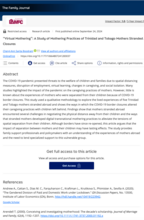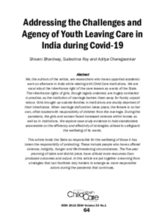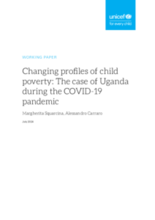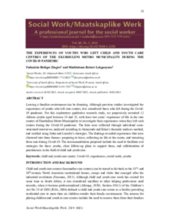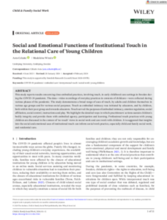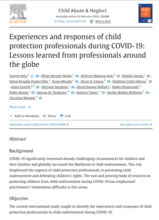This section includes resources on the response to the COVID-19 pandemic as it relates to child protection and children's care.
News on COVID-19 and Children's Care
Webinars and Events on COVID-19 Response
Displaying 1 - 10 of 756
This study used a qualitative methodology to explore the lived experiences of five Trinidad and Tobago mothers stranded abroad and shows the ways in which the COVID-19 border closures altered their caregiving practices with children left behind.
This article holds the State as responsible for the wellbeing of those it has taken the responsibility of protecting. These include people who have suffered violence, indignity, hunger and life-threatening circumstances. The five-year planning of state and district plans have utilised more resources than produced outcomes and output. In this article we put together a learning from strategies that can facilitate duty holders to emerge as more responsible actors during the pandemic that continues.
This study examines the socioeconomic determinants of COVID-19-induced poverty among households with children in refugee-hosting districts of Uganda, comparing refugee and host households. It also investigates the role of social assistance in preventing poverty.
In this study the authors explored the coping resources and assets of care leavers during and following the pandemic from the perspective of 44 care leavers in Israel aged 18–29.
The authors of this exploratory qualitative research study recruited 12 African youths aged between 18 and 23, with at least two years’ experience of life in the care centres of Ekurhuleni Metro Municipality in Gauteng, South Africa, to investigate their experiences when they left these centres during the COVID-19 pandemic.
The long-term consequences of COVID-19 have been tough for children around the world, but even more so for young children already in humanitarian crises, whether due to conflict, natural disasters, or economic and political upheaval. Drawing on research and voices from the Global South, this book showcases innovations to mobilize new funds and reallocate existing resources to protect children during the pandemic.
This webinar examined care in the context of COVID-19, climate change, and conflict. Speakers explored how the pandemic has left a lasting legacy on the care system in Uganda and examined the impacts of climate change-related drought on children's care in Kenya. They also explored efforts to deliver effective care for children during conflict in Ethiopia.
The survey of the COVID-19 outbreak focused on studying the impact and long-term consequences on care leavers, especially residential care leavers who are living independently.
This study reports results concerning close embodied practices, involving touch, in early childhood care settings in Sweden during the COVID-19 pandemic.
The current international study sought to identify the experiences and responses of child protection professionals to child maltreatment during COVID-19.

